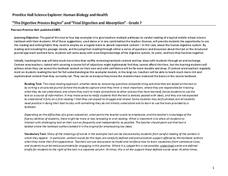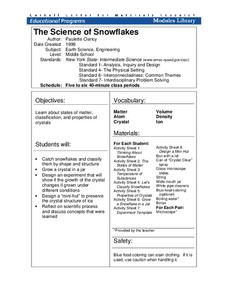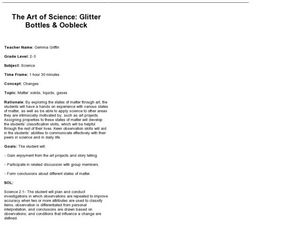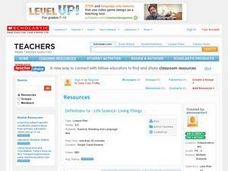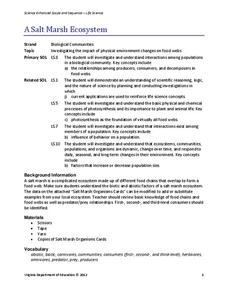Curated OER
Polar Scientists: Polar Science
Research skills are extremely important and they can be linked to any subject. Get your class thinking about scientists that study the polar region, what they do, and how they get funded to continue their research. Each child uses a...
Curated OER
Lesson Plan Outline for Rainbow Science
Young scientists study light reflection and refraction as they determine the critical angle, the rainbow angle, and color separation in rainbows. Teams record the data they collect in a shared spreadsheet and discuss results with the class.
Savvas Learning
"The Digestive Process Begins" and "Final Digestion and Absorption"
Want your class to digest text more thoroughly? Middle schoolers learn about the digestive system in the lesson and reinforce informational text reading skills through a variety of strategies. They engage in a close reading approach,...
CK-12 Foundation
Rocks and Processes of the Rock Cycle: One Rocks Turns to Another...
Geology scholars test their rock identification skills in an interactive that examines the rock cycle from the three main nodes of rocks. Other topics include visual clues to rock identity and the conditions needed to make rocks change...
Cornell University
The Science of Snowflakes
Who can grow the best crystals? Challenge class members to develop strategies for enhancing growth in the crystals. Through a lab investigation, learners study the properties of crystals and test the effectiveness of different growth...
Curated OER
Explore: 5th Grade Dissolved Oxygen
Fifth graders, in groups, use basic science process skills to measure and compare the dissolved oxygen levels and pH levels of distilled, stream, and pond water.
Curated OER
The Art of Science: Glitter Bottles and Oobleck
After having a class discussion on the three states of matter, young scientists utilize the wonderful substance, Oobleck in order to experience something that changes states of matter. They also create "sparkle jars" which...
Curated OER
More Basic Biotechnology Tools, Sorting & Copying DNA
You can use these slides to explain the many complicated steps of the Polymerase chain reaction. The diagnostic and forensic uses of gel electrophoresis are detailed. This PowerPoint could be used to communicate facts, and also to prompt...
Oregon State
World Map of Plate Boundaries
Young geologists piece together the puzzle of plate tectonics in an earth science lesson. Given a physical map of the world, they search for land formations that indicate the location of different types of plate boundaries.
California Academy of Science
Coral and Chemistry
Using cabbage juice as a pH indicator, future scientists explore the effect of increasing carbon dioxide on the pH of the ocean and relate it to the health of coral reefs. Ideal for an earth or environmental sciences course, this lesson...
Science 4 Inquiry
Atmospheric Layers
Space diving refers to the act of jumping from outer space and falling through Earth's atmosphere before parachuting to land. Scholars learn about this extreme activity and study the layers of the atmosphere they must conquer in the...
Curated OER
The Science of Respiration and Blood Circulation
Fifth graders study how respiration and circulation are connected. In this respiratory lesson students complete several activities to better understand heart rate and carbon dioxide in the body.
Curated OER
Life Science: Living Things
Have your class build their vocabulary bank by studying life science terms. Basic terms like organism, cell, unicellular, and vertebrate are included on the definition sheet provided. Demonstrate how to identify different life science...
Curated OER
More Basic Biotechnology Tools
You can use these slides to explain the many complicated steps of the Polymerase Chain Reaction. The diagnostic and forensic uses of gel electrophoresis are detailed. This PowerPoint could be used to communicate facts, or to prompt...
Curated OER
Water Cycle - A SiteMaker Presentation
Have your young scientists explore a single element of the water cycle and write a report to explain findings. Your class can take their writing through all the steps of the writing process and publish it using a Web-based multimedia...
Virginia Department of Education
A Salt Marsh Ecosystem
What a web we weave. Pupils use yarn as the primary resource to create a web depicting the intricacies of a salt marsh ecosystem. They participate in a question and answer session, which leads to an in-depth facilitated discussion about...
CK-12 Foundation
Atoms to Molecules: Constructing Helium
Protons and neutrons and electrons, oh my! Physical science scholars get hands-on with interactive atomic modeling. Starting with a simple helium atom, participants create and name ions, then build isotopes. Questions throughout the...
NASA
Radiation Shielding on Spacecraft
Here is a terrific science lesson for your elementary schoolers. In it, learners analyze different materials to simulate space radiation shielding on spacecraft, then select the best material to use to build one. This is a classic...
CK-12 Foundation
Rocks: Anatomy of Granite
Get earth science students excited about the formation of rocks with an engaging interactive resource. Learners analyze the composition of granite, then study the various processes that work together to make igneous, sedimentary, and...
Royal Society of Chemistry
Equilibria—Gifted and Talented Chemistry
Teaching is a balancing act! Keep things on an even keel with a comprehensive equilibrium lesson plan. The resource covers reversible and irreversible reactions, Le Chatelier's Principle, and the industrial applications of equilibrium...
Curated OER
What it means to be a scientist and What is the Scientific Process?
Students read an article and describe the scientific method. In this scientific process activity, students compare basic science and applied science. Students discuss ideas such as team work, application of an idea, how scientists...
Serendip
How Do Biological Organisms Use Energy?
When an organism eats, how does food become energy? Young biologists follow glucose through the process of cellular respiration to the creation of ADP using a discussion-based activity. The resource also highlights conservation of mass...
Discovery Education
Jets in Flight
This Discovery Education activity provides the information needed to understand the basics of flight. Before taking off, young pilots learn the eight stages of the engineering design process. Small groups then design and build an...
Nevada Outdoor School
Let It Snow! Let It Melt!
Winter weather offers a great opportunity to teach young scientists about the states of matter. This activity-based lesson includes a range of learning experiences, from experimenting with the rate at which ice melts to singing a song...




